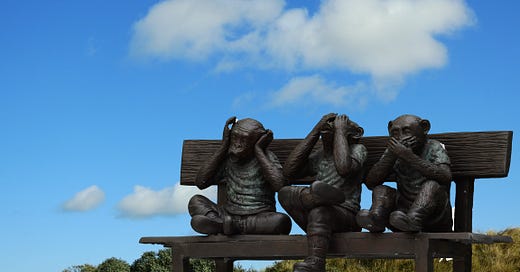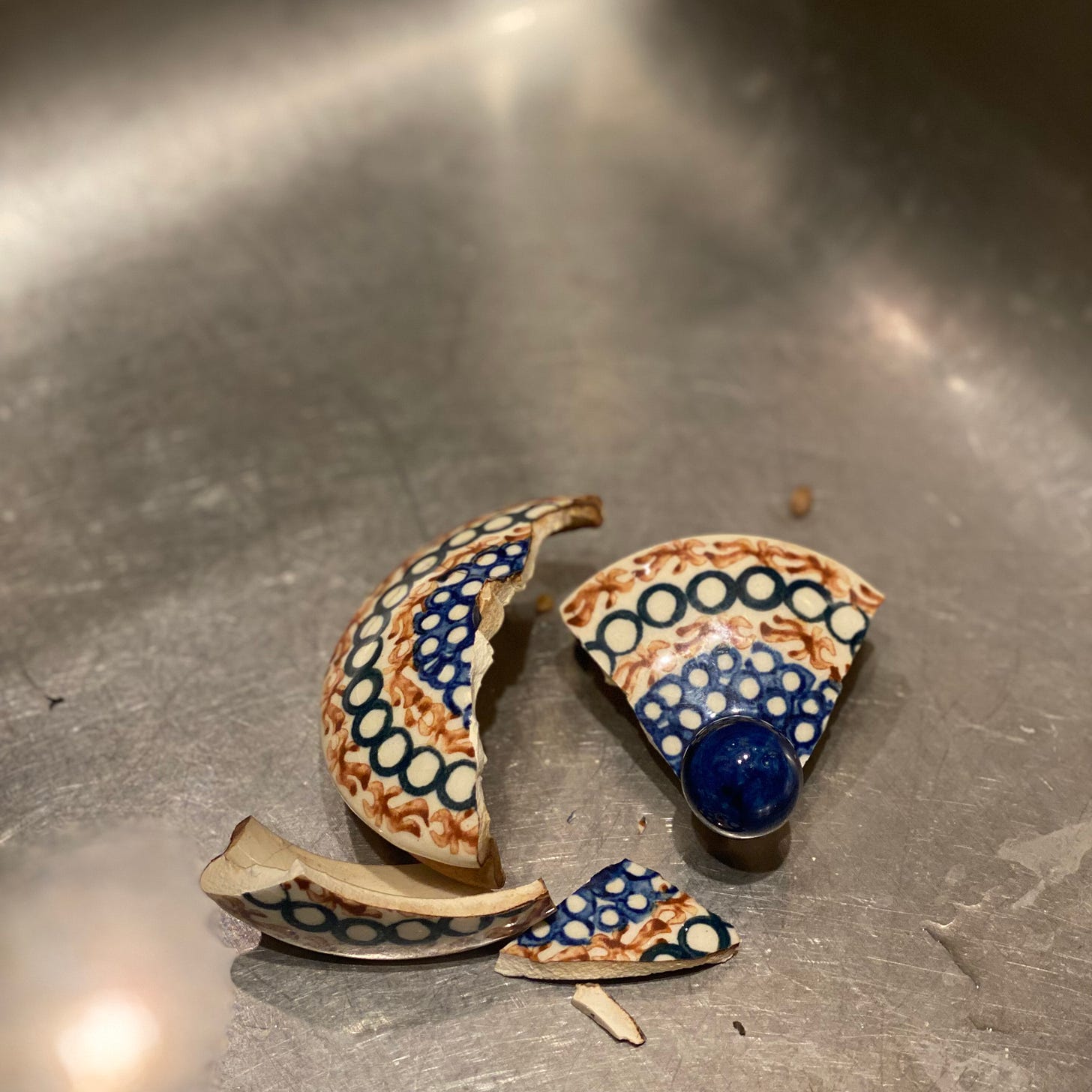The man-half and I start our days predictably, with routines that cast backward glances as they smirk and sprint across the Rubicon toward The Golden Years. But the other morning, one ritual went to pieces, launching a cascade of thoughts.
Everything began normally. The green tea we brew daily was finished steeping and he was pouring out when the lid to our 33-year-old teapot slipped away, landing in the sink. As one might expect from such a vulnerable workhorse, the piece was already badly compromised. Chunks of it had been glued in place after previous accidents, and there was a hairline fracture that ran from rim to knob. This was the final blow.
“Well,” he said, not making eye contact, “there goes that.”
I might have let fly a comment or three about how utterly unsurprising it was that this happened on his watch. Despite my many flaws, a propensity for dish carnage is not among them, at least not compared to Sir Breaks-a-Lot. The reality is, though, that this lovely vessel, a wedding shower gift from his mother, had a good run. It was bound to happen.
What occurred afterwards had nothing to do with the material loss, or how we handled ourselves in the moment, neither of which I would consider all that consequential. What struck me most was the sound. A 3½ ounce ceramic dome met up with our stainless-steel sink, and the result was an emphatic BLANG! I jumped. And I knew what had happened without asking.
Sound is our teacher. We know things because we hear them. Maybe, like me, you accurately predict when the water for your tea has reached the desired temperature before the switch snaps off or the pot whistles. Maybe you know your dog is on the other side of the door, anxious to greet you, because you can hear the snuffling. Surely you’ve learned, by now, that raised voices suggest alarm or anger.
Sound helps us map our environment, anticipate pleasure and avoid danger. It can focus our thinking or complicate it. It can light us up or lay us low. But what are we not hearing? What do we need to listen to more carefully?
I guess it wasn’t a cascade of thoughts; it was more of an avalanche.
Anyone who’s ever been around a teenager with a sound system knows that one person’s symphony might be another person’s cacophony, but some sounds appear to be universally disturbing. A while back, to gain insight into the prospect of eliminating irritating noises from our environments, a British professor of acoustic engineering named Trevor Cox set up a survey that elicited over a million votes. He asked people to rate the most offensive of 34 different sounds.
Vomiting came up first. (I couldn’t resist.) I noticed, though, that all the other top selections—except for flatulence, which, I mean—were sounds with varying degrees of shrillness, like microphone feedback, wailing babies and poorly played violins.
Guests of The Science of Sound podcast explore the probable neuroscience behind these results while also discussing music theory, biology, and learned associations. Their lively and humorous conversation also helps listeners understand why the themes for Psycho and Jaws are so impactful. I totally get it. The mere mention makes my heart rate spike.
And that’s the thing about certain noises: They can make us jump, or wince, or want to run screaming in the opposite direction. In fact, another study a few years later determined that “Human screams have a unique acoustic property that triggers the brain’s fear centre more effectively than almost any other sound.” We’re hardwired to want to keep ourselves and those we love safe.
Having established that loud, high-pitched sounds are likely to set off our fight or flight response, it’s not surprising that noise pollution presents a formidable health concern for those living in bustling cities or working in noisy environments. People who must endure both are at particular risk, but even folks in more rural locations are subject to sound-induced stress. (Yep, I’m looking at all the loud-proud exhaust system lovers out there.)
For the record, according to the National Council on Aging, sounds above 70 decibels can be harmful, and extended exposure to sounds above 80 decibels can impair hearing. Alarm clocks run around 80, lawn mowers and hair dryers around 90, a car horn 120, a jackhammer, 130.
The consequences? Hearing loss, cardiovascular disease, anxiety, depression, and annoyance. I’d like to laugh at the last one, but with self-restraint apparently in dangerously low supply these days, I’m taking it just as seriously as the others.
Short of taking ourselves off to an ashram, what are we supposed to do?
Plants. Lots of plants. We’re called to bring then into our living and working spaces. They buffer sound. They also increase microbial diversity and help reduce stress. Nifty! We can plant them outside if space and means allow, but we definitely need to green up our insides.
Manage the pinging and dinging. Find a better ring tone. Choose a new alarm sound. I just switched to this, which I’m sure is why I’m so damn cheerful today.
In the same vein, we should monitor other incessant noise. If we leave the television on, shut it off. Same for music. Carve out 20 minutes a day for quiet time. Remember how that kind of a reset used to turn our little Tasmanian devils back into lovable toddlers? We’re no different.
Whenever we can, go to places with trees. Go more often. They absorb sound and help us tap into our inner calm. We’ve all done this already and felt the effects immediately. The great news is that it still works even if we’re within hearing distance of other human-made sounds.
And when we get out there, among the trees and under the sky, listen. Listen to the sounds that compel us to come away from our built environments and devices, that remind us how singing began.
At the community garden last week, countless European starlings congregated in a sentinel silver maple tree, with the clack and chatter of their seasonal conversations. In my yard, grey squirrels buzz and kuk amid their frenzy to bury enough food for winter. My slippers brush the kitchen floor as I hurry to click off the burner. The treble notes of the kettle just dropped to a softer hum, an alto, with more roundness. It’s time to make tea.
~Elizabeth






Your narratives always trigger so many thoughts, memories, feelings. I am awakened to the leaf blower someone is using nearby, and permit myself to acknowledge my annoyance. For today, I will seek and celebrate pleasing, reassuring sounds—both those from my natural environment and from within my little living space. My pup, curled up to me just moaned in pleasure to be snuggled next to me.
love, love, love.... I've always been amazed at how quickly a shrill sound can make me argumentative and sometimes even semi-angry.. I'm gonna be hanging around more trees and bushes for goodness sake.... I always wonder in regards to hearing if we don't sometimes hear what we want to hear..... In other words you and I walking down the sidewalk of a busy New York City street one of us just might hear a child's voice ahead holding his mother's hand.... While the other does not.... And then the person in front of us drops coins and they clink... One of us instantly notices while the other one still listens to the child's voice.. hmmmmm... I have discovered that sometimes sounds even bring out our prejudices and greediness.... Oh maybe it's just me.... Great words Betsy....